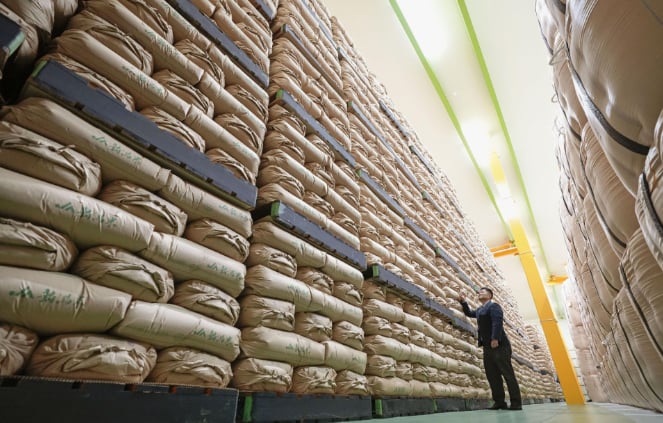November 26, 2025 | 10:32 GMT +7
November 26, 2025 | 10:32 GMT +7
Hotline: 0913.378.918
November 26, 2025 | 10:32 GMT +7
Hotline: 0913.378.918

Stockpiled rice in a storage facility in Saitama Prefecture on Feb. 18, 2025. Photo: Kyodo.
On Feb. 14, the government said it would release up to 210,000 tons of its stockpiled rice, to be handed over to wholesalers in mid-March after it has been bid for and expected to hit store shelves between late March and early April.
The farm ministry expected the announcement alone would lead to lower prices before the release of the stockpiled rice. But there has been no such effect, an executive at a major rice wholesaler said.
Wholesale prices of Koshihikari brown rice from Niigata Prefecture, for example, was between 48,300 yen ($320) and 48,500 yen per 60 kilograms as of Feb. 26, little changed from a month earlier, according to rice market research firm Beikoku Databank.
"Once the results (of the bidding) are revealed, it will have an effect on lowering prices," an official at the research firm said.
The government is scheduled to release 150,000 tons of rice in the first stage, and could release an additional 60,000 tons if the need arises.
According to the consumer price data released last month, rice prices surged 27.7 percent in 2024 from the previous year, the largest increase since 1975. In December alone, prices soared 64.5 percent from a year earlier.
The spike in prices followed a poor harvest in the summer of 2023 due to a period of high temperatures that reduced the amount of rice available for distribution the following year. A sharp rise in the number of foreign tourists has also driven up rice consumption at restaurants.
The Japanese government has 910,000 tons of rice stockpiled, with the planned release equivalent to over 20 percent of the reserves.
KyodoNews

(VAN) An Giang promotes supply-demand connections, standardizes quality and builds value chains, creating a foundation for sustainable bird’s nest development and aiming to expand exports.
/2025/11/24/5339-4-nongnghiep-075331.jpg)
(VAN) Recently, the conference on 'Sustainable Fisheries Linkage Chain - Tilapia for Export' took place in Tien Hai commune, Hung Yen province.
/2025/11/21/4309-2-153400_128.jpg)
(VAN) Green and low-emission rice is paving the way for Vietnamese rice to enter high-end markets, marking the beginning of a transformation journey toward greening and elevating the national rice brand.

(VAN) ‘Right to Win’ outlines a national action plan that shapes a new vision for Viet Nam’s agriculture in an era of renewal and global integration.

(VAN) Lam Dong’s farmed sturgeon output this year is expected to reach 2,300 tons, worth VND 450 billion, affirming the brand’s position on the market.

(VAN) A surge in Ukrainian egg exports, largely driven by soaring sales to the UK over the last few years, has notably pushed up egg prices on the domestic market.

(VAN) The price of Arabica Catimor coffee in Quang Tri is currently at VND 25,000–27,000/kg (fresh cherries), the highest level ever recorded